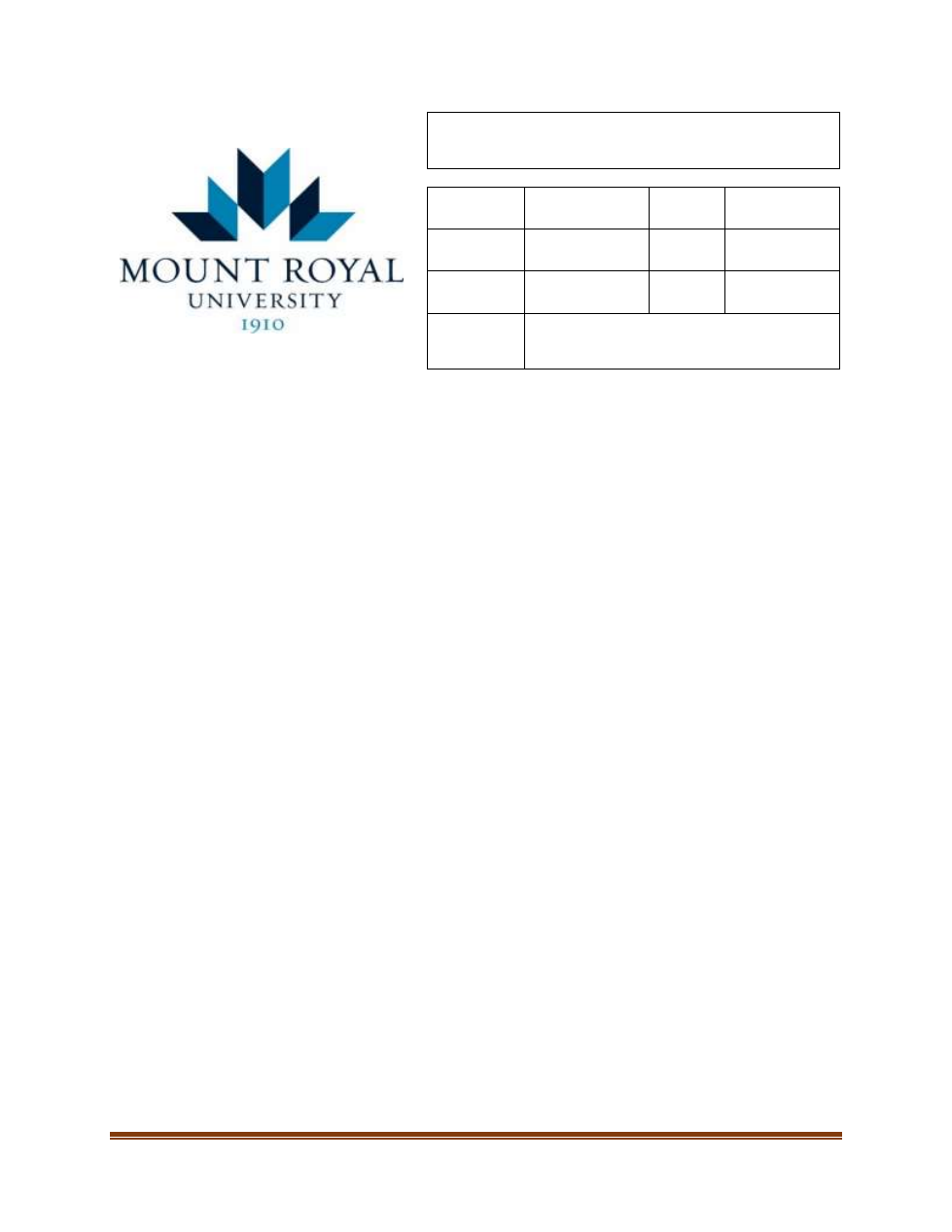
Classification - Staff Procedures
– August 2004
Page 1 of 6
CLASSIFICATION - STAFF PROCEDURES
Procedure
Type:
Management
Initially
Approved:
December 13,
1993
Procedure
Sponsor:
VP, Finance &
Administration
Last
Revised:
August 2004
Administrative
Responsibility:
AVP, Human
Resources
Review
Scheduled:
May 2025
Approver:
Executive Leadership Team
A.
PROCEDURES
1.
PROCESS FOR CLASSIFICATION REVIEW
1.1
Department Requests
A Department Head may request a classification review of any position or positions
within their Department by submitting an updated and approved Position
Description to the Department of Human Resources.
1.2
Employee Requests
An employee may request a classification review. An updated Position Description
form should be submitted to the Department Head for signature and comments, to
the next line of supervision for signature, and then forwarded to the Department of
Human Resources.
1.3
Human Resources Request
The Department of Human Resources may initiate a classification review of a class
or a group of classes. Updated Position Descriptions will be requested for all
positions in the classes under review and in most cases a position audit conducted.
1.4
Time Frame
In normal circumstances, the Department of Human Resources will not in respect
of any position:
a. Accept a request for a review of the classification of that position; or,
b. Render a classification decision,
until at least six months have elapsed from the date of the last allocation decision.
1.5
A Human Resources Consultant will, in most cases, meet with the incumbent
and/or supervisor to review the position description. The Job Evaluation
Committee will then meet to evaluate the position in terms of the ten factors of the
plan. The employee and supervisor will receive written notification of the

Classification - Staff Procedures
– August 2004
Page 2 of 6
classification decision. The employee and/or supervisor may appeal the
classification decision.
2.
APPEAL PROCEDURE
The days indicated in the following appeal procedures are calendar days.
2.1
Procedure
2.1.1
An appeal of classification allocation must be made in writing, on the
prescribed form, to the Associate Vice-President, Human Resources, and
copied to the employee's supervisor, within twenty-one (21) days of receipt
of the classification allocation decision.
2.1.2
If separate, concurrent appeals are submitted on the same position by the
incumbent and the supervisor, the appellant is deemed to be the
employee.
2.1.3
Upon receipt of an appeal, and based on the written submission, the
Associate Vice-President, Human Resources, shall decide whether or not
an appeal is valid. In order for an appeal to be valid it must be submitted
within the allotted time frame, by requesting classification to another
established classification and not be addressing pay considerations.
2.1.4
If valid, the appeal will be forwarded to Step 1.
Step 1:
a. The Human Resources Consultant responsible for classification and
compensation will conduct a position audit and reconvene that portion
of the Job Evaluation Committee that had initially evaluated the
position (if these members are not available, a majority of these
members will meet). The supervisor of the position will present
information to the Committee and answer any questions regarding the
position. This Committee will review all the information obtained and
re-evaluate the position.
b. The Human Resources Consultant will extrapolate the re-evaluation
data, determining the classification allocation of the position, and
advise the appellant and supervisor that:
i.
The appeal has been granted and the position re-allocated; or,
ii.
The appeal has been denied.
c. The appellant and/or supervisor will be informed in writing, within
twenty-eight (28) days of receipt of the appeal, of the decision resulting
from this review.
2.1.5
Failing resolution, the appellant may request the appeal proceed to Step
2. This request must be made in writing to the Vice-President,
Administrative Services, within ten (10) days of receipt of the notice of
decision as indicated in Step 2.1.4, c., above.

Classification - Staff Procedures
– August 2004
Page 3 of 6
Step 2:
a. Upon receipt of a request to proceed to the second step of the appeal
process, the Vice-President, Administrative Services, will establish an
Appeals Committee, which will review the appeal. This Committee will
consist of the Vice-President, Administrative Services, as Chair of the
Committee, and that portion of the Job Evaluation Committee that was
not involved in the initial review (if all these members are not available,
a majority of these members will meet).
b. At the request of either party, the appellant and/or supervisor will
appear before the Appeals Committee for the purpose of presenting
information and supporting argument, as well as responding to
Committee questioning. The Committee, in consultation with the
appellant, may request that other University employees, who may
have knowledge of the duties and responsibilities of the position,
appear before the Committee. The appellant may be present during
these appearances.
c. The Appeals Committee will review the position in light of the evidence
obtained and re-evaluate the position.
d. The Vice-President, Administrative Services, in consultation with the
Human Resources Consultant responsible for Classification and
Compensation, will extrapolate the re-evaluation data, render a
decision as to the classification allocation of the position, and advise
the appellant that:
i.
The appeal has been granted and the position re-allocated; or,
ii.
The appeal has been denied.
e. The decision of the Vice-President, Administrative Services, shall be
in writing to the appellant, the Supervisor/ Department Head, the
Department of Human Resources, and the President of the Mount
Royal Staff Association, within fourteen (14) days of the final
appearance of the appellant before the Committee. This decision
shall be final and binding.
3.
SUPERVISORY RESPONSIBILITIES
3.1
When a support staff position is assigned supervisory responsibilities over another
support staff position(s), there are important implications regarding the
classification and compensation of the supervisory position, as well as the
possibility of one member of the Mount Royal Staff Association being involved in
the evaluation and discipline of another Association member. For these reasons,
supervisory responsibilities may only be assigned according to the definitions,
below.
3.2
Criteria
A support staff position may only be assigned full supervisory responsibility if the
existence of one or more of the following criteria make it unreasonable for a
management, faculty or an existing support staff supervisory position to assume
such responsibility.

Classification - Staff Procedures
– August 2004
Page 4 of 6
3.2.1
Number of Positions to be Supervised: It shall normally not be acceptable
for one support staff position to have full supervisory responsibility over
just one other support staff position (i.e., there normally must be the full-
time equivalent of two or more regular support staff positions to be
supervised).
3.1.2
Physical Proximity: If the primary place of work of the position(s) to be
supervised is physically remote from the office or work area of a
management, faculty or existing support staff supervisory position, a
support staff position (who shared the same place of work) as the
position(s) to be supervised may be assigned full supervisory
responsibility. The reason for doing this would be to ensure daily contact
with the position(s) to be supervised in order that full supervisory
responsibilities can be performed effectively.
3.1.3
Workload: If the workload of a management, faculty or existing support
staff supervisory position is characterized by the following factors, a
support staff position may be assigned full supervisory responsibility as a
means of helping reduce such workload:
a. Frequently visits agencies, institutions, organizations, etc., outside the
University as a normal job function.
b. Already has full supervisory responsibilities for several other
management or support staff employees. That is, the "span of
supervision" is considerable making it difficult to perform additional
supervision effectively. There is a need to spread or delegate the
supervisory workload.
c. Administers/manages several different operational areas. While the
"span of supervision" may not be considerable, there may be many
different activities placing demands on time and effort. There is a need
to focus effort on the different operational areas and, therefore,
delegate supervisory responsibility.
3.3
Approval
3.3.1
The assignment of full supervisory responsibilities as recommended by a
Dean or Director, must be approved by the appropriate Division Head (i.e.,
President or Vice-President), following consultation with the Human
Resources Consultant from the Department of Human Resources.
3.3.2
The assignment of partial supervisory responsibilities must be approved
by the appropriate Manager, Chair, Dean or Director.
B.
DEFINITIONS
For the purpose of determining the classification and compensation for a position, the difference
between partial supervision and supervision is defined.
(1)
Partial Supervision:
this includes assigning, guiding and generally reviewing the
work of another employee(s) (full-time, part-time or casual).
Partial supervision can include the day-to-day assignment of
work, but does not include the responsibility to formally
assess the performance of other employees, nor to make

Classification - Staff Procedures
– August 2004
Page 5 of 6
decisions affecting the employee's terms and conditions of
employment.
(2)
Policy:
means the Classification - Staff Policy
(3)
Supervision:
in addition to assigning, guiding, and generally reviewing the
work of another employee(s), supervision means having the
responsibility to administer some aspects of the Board of
Governors
– Mount Royal Staff Association Collective
Agreement and University policy affecting the terms and
conditions of employment. A position with supervisory
responsibilities will be assigned a majority of the following:
- conduct formal performance appraisals (i.e., conduct the
interview and sign the appropriate form).
- administer minor discipline, and in cases of more serious
discipline, recommend appropriate action to a manager
or chair.
- conduct interviews for the purpose of recruitment and
recommend hiring to a manager or chair.
- approve routine absences from work (i.e., vacations,
medical appointments).
- approve minor or relatively standard changes to regular
hours of work (i.e., overtime).
- approve the duties and responsibilities of supervised
employees
(i.e.,
sign
the
appropriate
position
descriptions).
(4)
University:
means Mount Royal University
C.
RELATED POLICIES
• Classification - Staff Policy
D.
RELATED LEGISLATION
E.
RELATED DOCUMENTS
• Collective Agreement between the Board of Governors of Mount Royal University and the
Mount Royal Staff Association

Classification - Staff Procedures
– August 2004
Page 6 of 6
F.
REVISION HISTORY
Date
(mm,dd,yyyy)
Description of
Change
Sections
Author
(Position Title)
Approver
(Position Title)
12/13/1993
NEW
08/2004
08/31/2017
Editorial
– formatting
University Secretary





